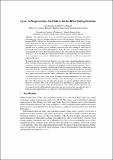Lynx: A Programmatic SAT Solver for the RNA-folding Problem
Author(s)
Ganesh, Vijay; O'Donnell, Charles William; Soos, Mate; Devadas, Srinivas; Rinard, Martin C.; Solar-Lezama, Armando; ... Show more Show less
DownloadDevadas-Lynx.pdf (229.1Kb)
OPEN_ACCESS_POLICY
Open Access Policy
Creative Commons Attribution-Noncommercial-Share Alike
Terms of use
Metadata
Show full item recordAbstract
This paper introduces Lynx, an incremental programmatic SAT solver that allows non-expert users to introduce domain-specific code into modern conflict-driven clause-learning (CDCL) SAT solvers, thus enabling users to guide the behavior of the solver.
The key idea of Lynx is a callback interface that enables non-expert users to specialize the SAT solver to a class of Boolean instances. The user writes specialized code for a class of Boolean formulas, which is periodically called by Lynx’s search routine in its inner loop through the callback interface. The user-provided code is allowed to examine partial solutions generated by the solver during its search, and to respond by adding CNF clauses back to the solver dynamically and incrementally. Thus, the user-provided code can specialize and influence the solver’s search in a highly targeted fashion. While the power of incremental SAT solvers has been amply demonstrated in the SAT literature and in the context of DPLL(T), it has not been previously made available as a programmatic API that is easy to use for non-expert users. Lynx’s callback interface is a simple yet very effective strategy that addresses this need.
We demonstrate the benefits of Lynx through a case-study from computational biology, namely, the RNA secondary structure prediction problem. The constraints that make up this problem fall into two categories: structural constraints, which describe properties of the biological structure of the solution, and energetic constraints, which encode quantitative requirements that the solution must satisfy. We show that by introducing structural constraints on-demand through user provided code we can achieve, in comparison with standard SAT approaches, upto 30x reduction in memory usage and upto 100x reduction in time.
Description
15th International Conference, Trento, Italy, June 17-20, 2012. Proceedings
Date issued
2012-06Department
Massachusetts Institute of Technology. Department of Electrical Engineering and Computer ScienceJournal
Theory and Applications of Satisfiability Testing – SAT 2012
Publisher
Springer Berlin / Heidelberg
Citation
Ganesh, Vijay et al. “Lynx: A Programmatic SAT Solver for the RNA-Folding Problem.” Theory and Applications of Satisfiability Testing – SAT 2012. Ed. Alessandro Cimatti & Roberto Sebastiani. LNCS Vol. 7317. Berlin, Heidelberg: Springer Berlin Heidelberg, 2012. 143–156.
Version: Author's final manuscript
ISBN
978-3-642-31611-1
ISSN
0302-9743
1611-3349